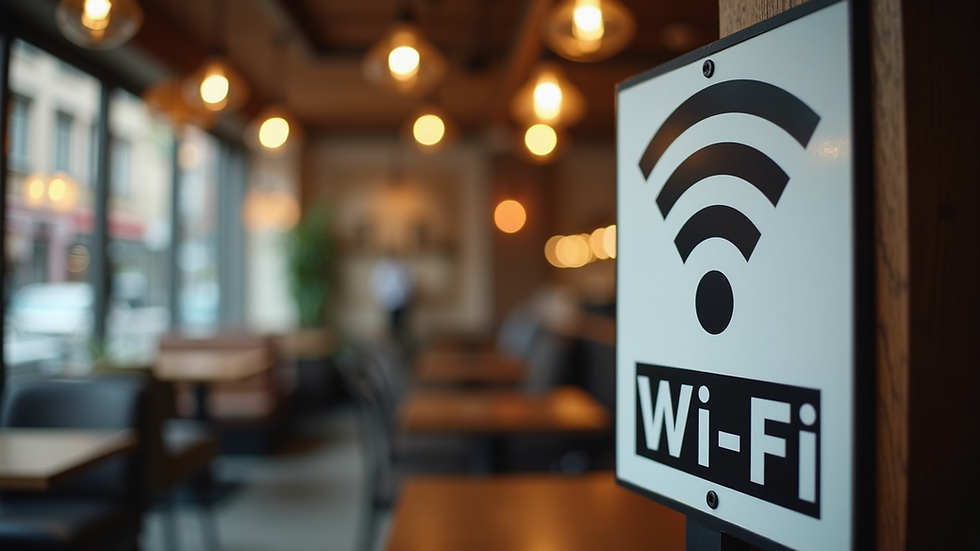Is Free Wi-Fi Ever Safe? (Short Answer: No. Here’s Why.)
- John W. Harmon, PhD

- Aug 12, 2025
- 3 min read
In today's fast-paced digital world, free Wi-Fi has become a common feature in cafes, airports, and various public places. However, the convenience of accessing the internet for free comes with serious hidden risks. These dangers especially affect small businesses that rely on digital connections. This blog post explores the threats posed by public Wi-Fi and provides actionable insights for small business owners to secure their sensitive information.
Understanding the Risks of Free Wi-Fi
Free Wi-Fi networks are often unsecured, making them vulnerable to cybercriminals. According to a 2022 survey from the cybersecurity firm Kaspersky, over 45% of users have connected to an unsecured Wi-Fi network. When you access a public Wi-Fi network, your data can be intercepted by anyone else on that network. This includes sensitive information like passwords, credit card numbers, and personal emails.
Many public Wi-Fi networks do not require a password, increasing the risk of unauthorized access. Cybercriminals can create fake hotspots that mimic legitimate networks. For example, in a café that offers free Wi-Fi, a hacker might set up a hotspot called "Café_Free_WiFi." If an unsuspecting user connects, the hacker can monitor their online activities and steal their data.

The Dangers of Data Interception
Data interception is one of the most significant risks when using free Wi-Fi. A report from Norton indicates that 74% of public Wi-Fi users do not take steps to protect their data. This oversight can lead to serious breaches, where hackers capture not only personal data but also crucial business-related information.
For small businesses, the fallout from data breaches can be severe. In 2023, the average cost of a data breach was estimated at $4.45 million. This figure includes direct financial losses, legal fees, and reputational damage. Small business owners must recognize that the risks of using free Wi-Fi extend beyond inconvenience—the impact can be far-reaching and detrimental to their operations.
Man-in-the-Middle Attacks
One alarming threat linked to free Wi-Fi is the man-in-the-middle (MitM) attack. In this scenario, a cybercriminal intercepts communication between two parties, allowing them to eavesdrop and steal sensitive information. According to a 2023 cybersecurity report, MitM attacks increased by 50% over the previous year, highlighting the growing threat.
Small businesses are especially vulnerable, as these attacks can expose confidential client information, trade secrets, and financial data. The aftermath of such an attack can be devastating, leading to loss of trust and revenue. It is crucial for small business owners to take proactive measures to protect their data while using public Wi-Fi.
The Importance of VPNs
To reduce the risks associated with free Wi-Fi, small business owners should consider using a Virtual Private Network (VPN). A VPN encrypts your internet connection, making it much harder for cybercriminals to intercept your data. Research shows that using a VPN can reduce the risk of data breaches by up to 90%.
Investing in a reliable VPN service is a cost-effective way to enhance your cybersecurity. For example, a VPN can cost as little as $5 per month. The peace of mind and added security it provides, along with the ability to browse anonymously, can significantly lower the risks associated with using public Wi-Fi.
Educating Employees on Wi-Fi Safety
Educating employees on the risks tied to free Wi-Fi is a critical step in cybersecurity. A study by CybSafe indicated that 80% of data breaches are linked to human error. Training sessions should cover recognizing secure networks, the necessity of using VPNs, and the dangers of accessing sensitive information over public Wi-Fi.
By creating a culture of cybersecurity awareness, small businesses empower their employees to make safer online choices. For example, a simple reminder to avoid entering sensitive data on public Wi-Fi can help prevent breaches.
Implementing Strong Security Measures
Beyond using VPNs and employee education, small businesses should also implement strong security measures to safeguard their data. This includes employing firewalls, antivirus software, and regularly updating systems to fix vulnerabilities.
Additionally, consider limiting access to sensitive information when employees connect to public Wi-Fi. By controlling the data available on unsecured networks, small businesses can significantly lower the risks of a data breach.
Protecting Your Business from Hidden Risks
Free Wi-Fi provides convenience but carries risks that can threaten small businesses. Understanding the potential dangers of public Wi-Fi, such as data interception and man-in-the-middle attacks, is crucial for safeguarding sensitive information.
By investing in VPNs, educating employees, and implementing robust security measures, small business owners can protect their data and minimize the risks associated with free Wi-Fi. As cyber threats continue to evolve, taking proactive steps to secure your business is not just wise; it's essential.
📅 Want to secure your Wi-Fi? Book your time here:
You can also check your security standing anytime with CyberScore:




Comments